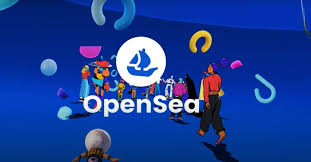In the rapidly evolving world of digital assets, one platform stands out for pioneering the concept of decentralized ownership and enabling creators, collectors, and investors to trade unique digital items: opensea marketplace. As the world’s largest and most popular marketplace for Non-Fungible Tokens (NFTs), OpenSea has captured the imagination of millions, offering a user-friendly platform where anyone can buy, sell, and auction rare digital assets, ranging from artwork and music to virtual land and in-game items.
What is OpenSea?
OpenSea is a decentralized marketplace that allows users to trade NFTs, which are blockchain-based digital items that represent ownership or proof of authenticity of a unique asset. Unlike cryptocurrencies such as Bitcoin or Ethereum, which are fungible and interchangeable, NFTs are one-of-a-kind or limited in supply, often representing digital art, collectibles, or virtual assets tied to games or metaverses. These digital tokens are typically built on the Ethereum blockchain, though OpenSea has expanded to support other blockchains such as Polygon, Klaytn, and Solana.
The NFT Revolution
The rise of NFTs over the past few years has revolutionized how we view ownership in the digital world. Traditionally, digital assets such as images, music, or videos were easily replicated, making it challenging to prove ownership or assign value to them. NFTs have solved this issue by providing a unique, verifiable token that proves the authenticity of a digital item. With the use of blockchain technology, NFTs enable true ownership, allowing creators to directly monetize their work while ensuring collectors can confidently invest in one-of-a-kind assets.
OpenSea plays a vital role in this ecosystem by offering a platform where creators can mint (create) their NFTs and list them for sale or auction. The marketplace hosts millions of items from a variety of categories, including art, music, virtual real estate, domain names, trading cards, and virtual goods for games.
How OpenSea Works
At its core, OpenSea is a decentralized marketplace, meaning there is no central authority controlling transactions. Users can interact with the platform using their cryptocurrency wallets (such as MetaMask, Coinbase Wallet, or Fortmatic) to connect to their accounts, make purchases, and list their NFTs for sale. Transactions are secured by blockchain technology, ensuring transparency and security for both buyers and sellers.
To get started on OpenSea, users need a digital wallet, some Ethereum (ETH) or other supported cryptocurrencies, and an understanding of how to interact with NFTs. Once a user has connected their wallet to OpenSea, they can explore the marketplace, discover new collections, and start bidding on or purchasing NFTs.
Key Features of OpenSea
- Wide Range of Digital Assets: OpenSea offers a vast selection of NFTs across many categories. From generative art and pixelated collectibles to virtual land in the metaverse, the marketplace serves as a hub for almost every kind of NFT imaginable. This diversity has attracted a broad user base, from seasoned collectors and investors to casual buyers and digital art enthusiasts.
- Decentralization and Trustlessness: OpenSea’s decentralized nature means that it operates without the need for intermediaries. This makes transactions faster and more secure, as the blockchain guarantees the ownership and authenticity of digital assets. OpenSea uses smart contracts to automate transactions, ensuring that both buyers and sellers are bound by agreed-upon terms.
- Minting NFTs: One of the key advantages of OpenSea is that anyone can mint their own NFTs directly on the platform. Artists, game developers, and creators can upload their digital items, set prices, and create collections that are immediately accessible to the global marketplace. This democratization of NFT creation has opened up new revenue streams for creators worldwide.
- Auctions and Bidding: OpenSea also enables auction-style sales, where sellers can set their NFTs for bidding. This feature has become particularly popular for rare or high-demand items, allowing buyers to place bids over a set period. Auctions provide a dynamic way to price assets, and they can sometimes lead to unexpected high-value sales.
- Community and Social Features: OpenSea has incorporated community-building features, allowing users to follow their favorite creators and collections, share their purchases, and engage in discussions. This social aspect of the platform fosters a sense of belonging and encourages the growth of NFT communities, where creators and collectors can interact directly.
The Future of OpenSea and NFTs
As NFTs continue to gain mainstream attention, platforms like OpenSea are poised for even greater growth. With the development of virtual worlds, metaverse spaces, and play-to-earn games, the demand for unique digital items will only increase. NFTs will likely evolve beyond digital art and collectibles to encompass virtual real estate, gaming assets, and other types of valuable digital goods.
Moreover, as blockchain technology becomes more integrated into various industries, NFTs could be used for practical purposes such as certificates of ownership, tickets for virtual events, and even as proof of identity in the digital world.
However, the NFT space is not without challenges. Environmental concerns surrounding energy consumption on blockchains like Ethereum, legal questions regarding copyright and intellectual property, and the potential for speculative bubbles are all issues that need addressing as the industry matures. OpenSea, along with other NFT platforms, will need to innovate in ways that reduce environmental impact, enhance user experience, and ensure a sustainable market.
Conclusion
OpenSea has played a pivotal role in shaping the NFT ecosystem and continues to be a leader in the space. By providing an accessible platform for creators and collectors to exchange unique digital assets, it has empowered millions to engage in the digital economy. As the NFT market matures, OpenSea is well-positioned to continue innovating and expanding its offerings, shaping the future of digital ownership, art, and virtual goods. Whether you’re a creator, collector, or curious newcomer, OpenSea offers an exciting gateway into the world of NFTs, where creativity and technology collide in groundbreaking ways.

